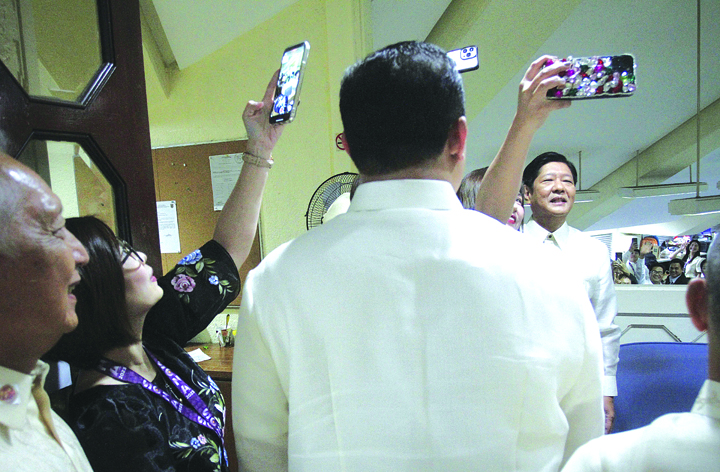
PRESIDENT Ferdinand R. Marcos Jr. said he is leveraging digital transformation to reduce graft and corruption, while providing Filipinos a better experience in transacting with the government.
In his second State of the Nation Address (SONA), Marcos said digitalization is a key pillar of his economic agenda, calling all government offices to “fully embrace digitalization to provide better service to the people.”
He added: “Through its vital frontline services and its back end functions, digitalization will support the government’s data-driven and science-based planning and decision making. It is the greatest most powerful tool not just to improve the ease of doing business, but also against many forms of graft and corruption.”
Digital transformation, Marcos said, complements the streamlining efforts of government since he assumed office last year.
This, he said, boosted efficiency in areas such as government payments, company and business registrations, issuance of permits and licenses, loan applications and revenue collection.
“All our digitalization efforts will be linked to our payment systems whose digital transformation has been accelerating at a remarkable rate. Digital payments accounted for 42 percent of the total retail payments made in 2022— whether by businesses or individuals or by the government. Its high trajectory is now well positioned to achieve Bangko Sentral’s target of 50 percent of total retail payments by this year,” Marcos explained.
He also mentioned the launch of the eGov Super App, a single and centralize mobile app that features several government services that can be digitally accessed by users.
DICT chief’s vow
The BusinessMirror earlier reported that Department of Information and Communications Technology (DICT) Secretary Ivan Uy vowed to consistently add more services into the eGov Super app, including the integration of local government services as well as the National ID System.
“Consistent with this transformative policy direction, all government officers must then ensure that their vital services are digitalized immediately in response to this call,” Marcos said.
The President also highlighted the continued improvement of Internet speeds in the Philippines, citing the 11-notch improvement in global rankings for broadband to 47th in June, as well as the eighth-place improvement in mobile data ranking to 83rd.
“There will be more improvements as our internet infrastructure undergoes further upgrades. Earlier this year, Starlink went live in the Philippines, now providing high-speed satellite broadband connectivity. Our national fiber backbone and broadband and massive projects will also deliver high connectivity and high speed internet,” he said.
Beyond providing better services to the Filipinos in the metropolis, Marcos vowed to democratize Internet access for people in far-flung areas in the country.
“We are prioritizing geographically isolated and disadvantaged areas. The DICT has been directed to consolidate all these digitalized government services into the eGov PH app to establish the National Government Portal and the Philippine Business Databank to improve the internet speed in our country,” he said.
Marcos also cited the role of e-commerce in driving further growth into the economy.
Lastly, he also vowed to further beef up cybersecurity in the Philippines, indicating that this is a priority area given that the first bill he signed into law was the SIM Registration Act.
“The first bill that I signed into law was the SIM Registration Act because we are mindful of the risks and vulnerabilities that can lead to negative consequences. Digital users and consumers shall be protected from identity theft, phishing or other online scams through essential systems and safeguards such as cybersecurity, data privacy, consumer complaint mechanisms, and financial literacy campaign,” Marcos said.
Globally, digital transformation has led to the reduction of needed manpower to operate systems and businesses, sparking a worldwide call for upskilling.
Marcos gave assurances, though, that the government, through the DICT and the Technical Education and Skills Development Authority (TESDA), is now working towards the creation of programs to upskill workers that will be affected by digital transformation.
“The trainings necessary to ease the transition of those whose jobs would be affected by the shift that digitalization are also now being included in the curricula and programs offered by TESDA, DICT and other agencies of government,” he said.
For Marcos, digital transformation should be embraced soon, and not a minute later.
“Digitalization is the call of today, not the call of the future but of the present. It is here and it is needed and it is needed today,” he said.
